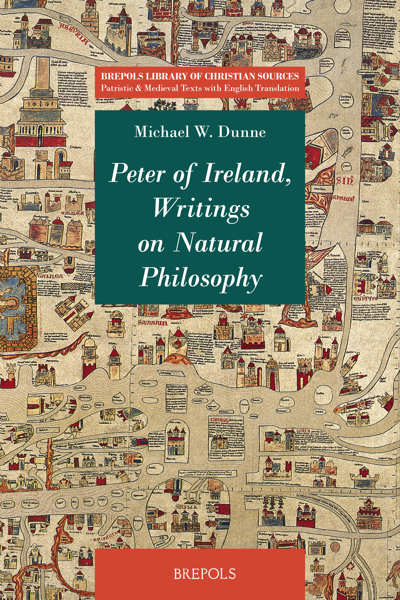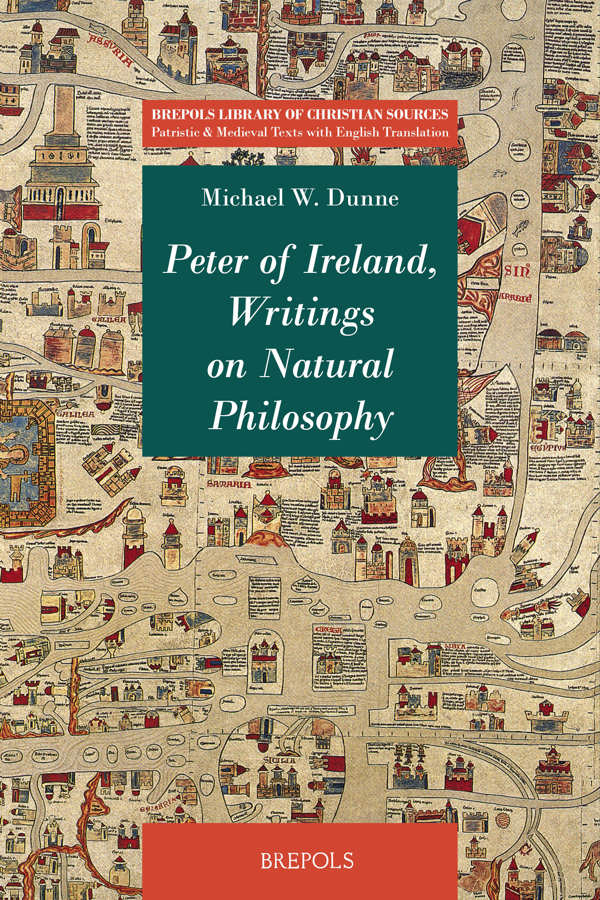
Peter of Ireland
Writings on Natural Philosophy
Commentary on Aristotle’s On Length and Shortness of Life and the Determinatio Magistralis
Michael W. Dunne
- Pages: 226 p.
- Size:156 x 234 mm
- Language(s):English, Latin
- Publication Year:2023
- € 50,00 EXCL. VAT RETAIL PRICE
- ISBN: 978-2-503-60568-5
- Paperback
- Available
- € 50,00 EXCL. VAT RETAIL PRICE
- ISBN: 978-2-503-60569-2
- E-book
- Available
A study and translation of the works on natural philosophy by the 13th-century thinker Peter of Ireland, who taught Thomas Aquinas at the University of Naples
"The book is elegantly presented, with indexes of names, classical and medieval texts, and the Latin terms for the topics dealt with in the texts. It is a pity that Ireland is not included in the portion of the Ebstorf map that serves as the cover for the book." (Charles Burnett, in Cambrian Medieval Celtic Studies 87, Summer 2024, p. 113-114)
Michael W. Dunne is Professor of Medieval Philosophy at Maynooth University with a research interest in Irish thinkers of the Middle Ages. He studied at University College Dublin and the Gregorian University, Rome. In addition to Peter of Ireland, he continues his research interests with the Lectura on the Sentences of Richard FitzRalph (1300-60). He has recently co-edited a collected volume entitled Tolerance and Concepts of Otherness in Medieval Philosophy (with Susan Gottlöber, Brepols 2022).
Peter of Ireland (Petrus de Ybernia) was born sometime around the beginning of the thirteenth century in Ireland, probably of a Norman family. He probably left Ireland aged around age 15 to pursue his studies abroad. His interest in medical and scientific questions would suggest a stay at Oxford, whereas his approach to logic would suggest a Parisian influence. By the middle of the century he was Professor of Logic and Natural Philosophy at the University at Naples. Peter is perhaps one of the best known of medieval Irish thinkers on the continent owing to the fact that he was held to be the teacher of the young Thomas Aquinas at Naples University from 1239–44. As such, it would be he who, in all likelihood, first introduced Thomas to the study of Aristotle and perhaps also to the commentaries of Avicenna and Averroes. The works presented here date from at least a decade later, and relate to lectures given at Naples in the 1250s and 1260s. The extent to which he was held in respect by his contemporaries is to be seen in his solution (determinatio) to the disputed question on the origin of the design of an animal’s body which was held before King Manfred around 1260. It was, perhaps the culmination of a famous scholarly career.




